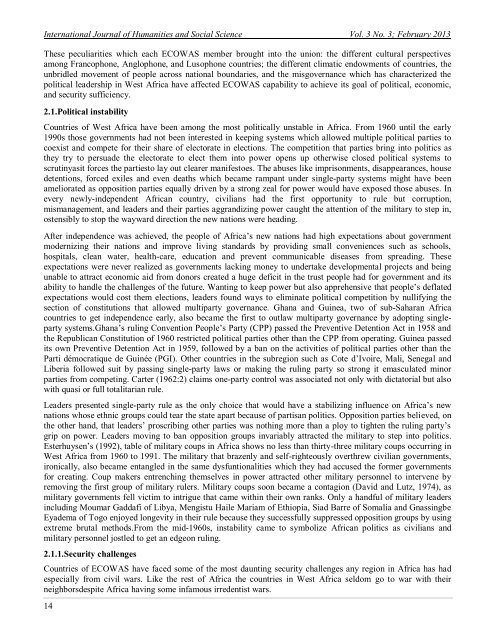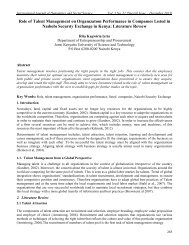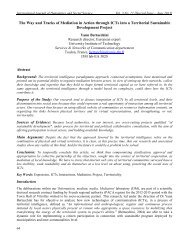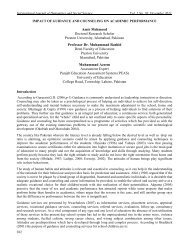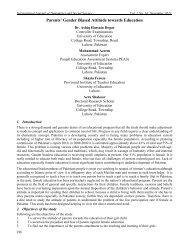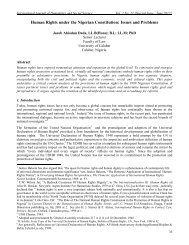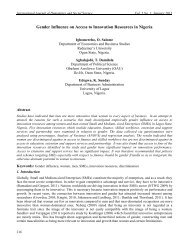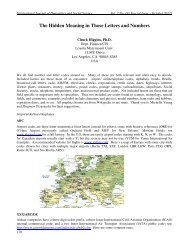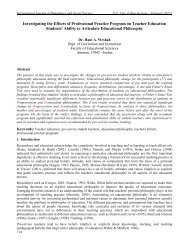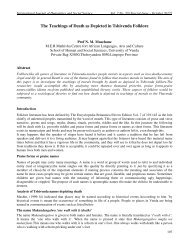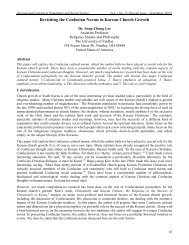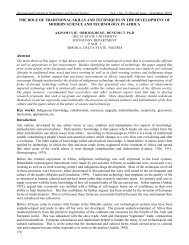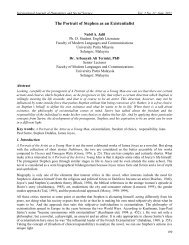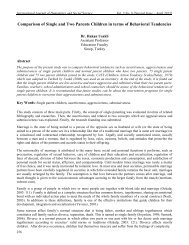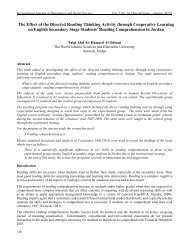The Political and Security Challenges Facing 'ECOWAS' in the ...
The Political and Security Challenges Facing 'ECOWAS' in the ...
The Political and Security Challenges Facing 'ECOWAS' in the ...
You also want an ePaper? Increase the reach of your titles
YUMPU automatically turns print PDFs into web optimized ePapers that Google loves.
International Journal of Humanities <strong>and</strong> Social Science Vol. 3 No. 3; February 2013<br />
<strong>The</strong>se peculiarities which each ECOWAS member brought <strong>in</strong>to <strong>the</strong> union: <strong>the</strong> different cultural perspectives<br />
among Francophone, Anglophone, <strong>and</strong> Lusophone countries; <strong>the</strong> different climatic endowments of countries, <strong>the</strong><br />
unbridled movement of people across national boundaries, <strong>and</strong> <strong>the</strong> misgovernance which has characterized <strong>the</strong><br />
political leadership <strong>in</strong> West Africa have affected ECOWAS capability to achieve its goal of political, economic,<br />
<strong>and</strong> security sufficiency.<br />
2.1.<strong>Political</strong> <strong>in</strong>stability<br />
Countries of West Africa have been among <strong>the</strong> most politically unstable <strong>in</strong> Africa. From 1960 until <strong>the</strong> early<br />
1990s those governments had not been <strong>in</strong>terested <strong>in</strong> keep<strong>in</strong>g systems which allowed multiple political parties to<br />
coexist <strong>and</strong> compete for <strong>the</strong>ir share of electorate <strong>in</strong> elections. <strong>The</strong> competition that parties br<strong>in</strong>g <strong>in</strong>to politics as<br />
<strong>the</strong>y try to persuade <strong>the</strong> electorate to elect <strong>the</strong>m <strong>in</strong>to power opens up o<strong>the</strong>rwise closed political systems to<br />
scrut<strong>in</strong>yasit forces <strong>the</strong> partiesto lay out clearer manifestoes. <strong>The</strong> abuses like imprisonments, disappearances, house<br />
detentions, forced exiles <strong>and</strong> even deaths which became rampant under s<strong>in</strong>gle-party systems might have been<br />
ameliorated as opposition parties equally driven by a strong zeal for power would have exposed those abuses. In<br />
every newly-<strong>in</strong>dependent African country, civilians had <strong>the</strong> first opportunity to rule but corruption,<br />
mismanagement, <strong>and</strong> leaders <strong>and</strong> <strong>the</strong>ir parties aggr<strong>and</strong>iz<strong>in</strong>g power caught <strong>the</strong> attention of <strong>the</strong> military to step <strong>in</strong>,<br />
ostensibly to stop <strong>the</strong> wayward direction <strong>the</strong> new nations were head<strong>in</strong>g.<br />
After <strong>in</strong>dependence was achieved, <strong>the</strong> people of Africa‟s new nations had high expectations about government<br />
moderniz<strong>in</strong>g <strong>the</strong>ir nations <strong>and</strong> improve liv<strong>in</strong>g st<strong>and</strong>ards by provid<strong>in</strong>g small conveniences such as schools,<br />
hospitals, clean water, health-care, education <strong>and</strong> prevent communicable diseases from spread<strong>in</strong>g. <strong>The</strong>se<br />
expectations were never realized as governments lack<strong>in</strong>g money to undertake developmental projects <strong>and</strong> be<strong>in</strong>g<br />
unable to attract economic aid from donors created a huge deficit <strong>in</strong> <strong>the</strong> trust people had for government <strong>and</strong> its<br />
ability to h<strong>and</strong>le <strong>the</strong> challenges of <strong>the</strong> future. Want<strong>in</strong>g to keep power but also apprehensive that people‟s deflated<br />
expectations would cost <strong>the</strong>m elections, leaders found ways to elim<strong>in</strong>ate political competition by nullify<strong>in</strong>g <strong>the</strong><br />
section of constitutions that allowed multiparty governance. Ghana <strong>and</strong> Gu<strong>in</strong>ea, two of sub-Saharan Africa<br />
countries to get <strong>in</strong>dependence early, also became <strong>the</strong> first to outlaw multiparty governance by adopt<strong>in</strong>g s<strong>in</strong>gleparty<br />
systems.Ghana‟s rul<strong>in</strong>g Convention People‟s Party (CPP) passed <strong>the</strong> Preventive Detention Act <strong>in</strong> 1958 <strong>and</strong><br />
<strong>the</strong> Republican Constitution of 1960 restricted political parties o<strong>the</strong>r than <strong>the</strong> CPP from operat<strong>in</strong>g. Gu<strong>in</strong>ea passed<br />
its own Preventive Detention Act <strong>in</strong> 1959, followed by a ban on <strong>the</strong> activities of political parties o<strong>the</strong>r than <strong>the</strong><br />
Parti démocratique de Gu<strong>in</strong>ée (PGI). O<strong>the</strong>r countries <strong>in</strong> <strong>the</strong> subregion such as Cote d‟Ivoire, Mali, Senegal <strong>and</strong><br />
Liberia followed suit by pass<strong>in</strong>g s<strong>in</strong>gle-party laws or mak<strong>in</strong>g <strong>the</strong> rul<strong>in</strong>g party so strong it emasculated m<strong>in</strong>or<br />
parties from compet<strong>in</strong>g. Carter (1962:2) claims one-party control was associated not only with dictatorial but also<br />
with quasi or full totalitarian rule.<br />
Leaders presented s<strong>in</strong>gle-party rule as <strong>the</strong> only choice that would have a stabiliz<strong>in</strong>g <strong>in</strong>fluence on Africa‟s new<br />
nations whose ethnic groups could tear <strong>the</strong> state apart because of partisan politics. Opposition parties believed, on<br />
<strong>the</strong> o<strong>the</strong>r h<strong>and</strong>, that leaders‟ proscrib<strong>in</strong>g o<strong>the</strong>r parties was noth<strong>in</strong>g more than a ploy to tighten <strong>the</strong> rul<strong>in</strong>g party‟s<br />
grip on power. Leaders mov<strong>in</strong>g to ban opposition groups <strong>in</strong>variably attracted <strong>the</strong> military to step <strong>in</strong>to politics.<br />
Esterhuysen‟s (1992), table of military coups <strong>in</strong> Africa shows no less than thirty-three military coups occurr<strong>in</strong>g <strong>in</strong><br />
West Africa from 1960 to 1991. <strong>The</strong> military that brazenly <strong>and</strong> self-righteously overthrew civilian governments,<br />
ironically, also became entangled <strong>in</strong> <strong>the</strong> same dysfuntionalities which <strong>the</strong>y had accused <strong>the</strong> former governments<br />
for creat<strong>in</strong>g. Coup makers entrench<strong>in</strong>g <strong>the</strong>mselves <strong>in</strong> power attracted o<strong>the</strong>r military personnel to <strong>in</strong>tervene by<br />
remov<strong>in</strong>g <strong>the</strong> first group of military rulers. Military coups soon became a contagion (David <strong>and</strong> Lutz, 1974), as<br />
military governments fell victim to <strong>in</strong>trigue that came with<strong>in</strong> <strong>the</strong>ir own ranks. Only a h<strong>and</strong>ful of military leaders<br />
<strong>in</strong>clud<strong>in</strong>g Moumar Gaddafi of Libya, Mengistu Haile Mariam of Ethiopia, Siad Barre of Somalia <strong>and</strong> Gnass<strong>in</strong>gbe<br />
Eyadema of Togo enjoyed longevity <strong>in</strong> <strong>the</strong>ir rule because <strong>the</strong>y successfully suppressed opposition groups by us<strong>in</strong>g<br />
extreme brutal methods.From <strong>the</strong> mid-1960s, <strong>in</strong>stability came to symbolize African politics as civilians <strong>and</strong><br />
military personnel jostled to get an edgeon rul<strong>in</strong>g.<br />
2.1.1.<strong>Security</strong> challenges<br />
Countries of ECOWAS have faced some of <strong>the</strong> most daunt<strong>in</strong>g security challenges any region <strong>in</strong> Africa has had<br />
especially from civil wars. Like <strong>the</strong> rest of Africa <strong>the</strong> countries <strong>in</strong> West Africa seldom go to war with <strong>the</strong>ir<br />
neighborsdespite Africa hav<strong>in</strong>g some <strong>in</strong>famous irredentist wars.<br />
14


